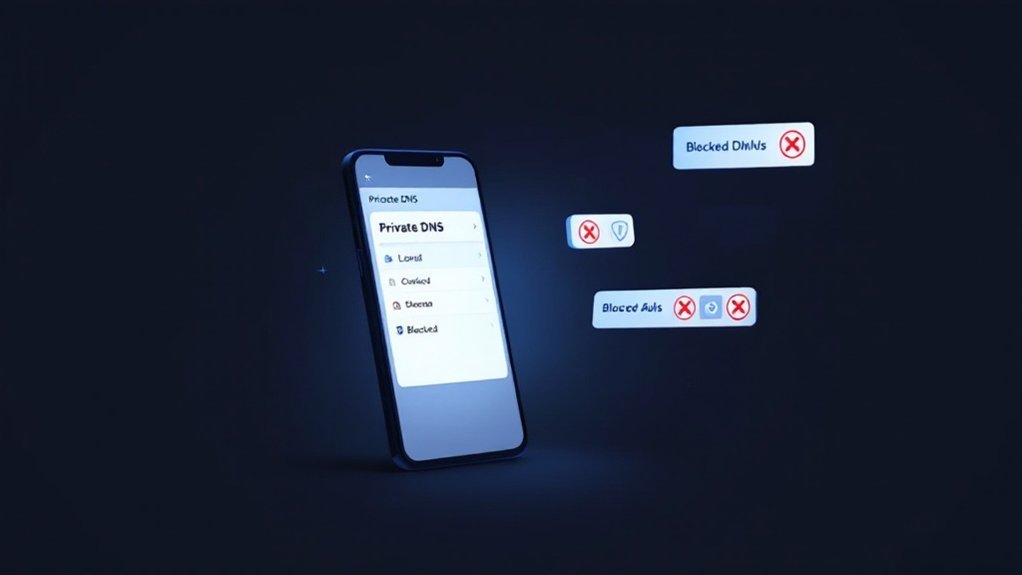Android users can block unwanted ads through several effective methods, including private DNS configuration, browser-based solutions, and dedicated applications. For basic protection, users can modify their private DNS settings to “dns.adguard.com” through Network & Internet settings on Android 9 or newer devices. Browser options like Brave and Firefox offer built-in blocking capabilities, whereas apps such as AdGuard and DNS66 provide system-wide protection without requiring root access. These solutions represent just the beginning of extensive ad control possibilities.

Nearly every Android user encounters intrusive advertisements during using their mobile device, but several effective methods exist to block unwanted ads across both browsers and applications. One of the most straightforward approaches involves modifying the device’s Private DNS settings, which can be accomplished by maneuvering to the Network & Internet settings and entering specialized DNS providers like “dns.adguard.com” or “one.one.one.one.” This method, available on Android 9 Pie and newer versions, offers system-wide ad blocking capabilities without requiring additional software installation. Users implementing this solution will notice ads appear as white boxes on various websites and applications. The removal of intrusive ads leads to faster browsing speeds and improved battery life.
Say goodbye to annoying ads on Android by modifying Private DNS settings – a simple yet powerful solution for system-wide blocking.
For users seeking browser-specific solutions, Chrome’s built-in features provide basic ad-blocking functionality through its Site settings menu. Although this approach effectively manages pop-ups and intrusive advertisements within the browser, it offers limited protection compared to dedicated ad-blocking solutions. Alternative browsers like Brave, Firefox, and Samsung Internet present strong ad-blocking capabilities through native features or supported extensions. These solutions help prevent malicious scripts from compromising your device security.
More extensive protection can be achieved through specialized applications like AdGuard, which establishes a local VPN to filter traffic across all applications and browsers. This solution, although potentially impacting battery life marginally, offers customizable filtering options and broader coverage than browser-based alternatives.
Likewise, DNS66, available through the F-Droid repository, provides system-wide ad blocking through host file manipulation without requiring root access.
For users willing to modify their devices more extensively, rooting Android devices permits the use of advanced solutions like AdAway, which directly modifies system host files to block advertisements at the device level. Although this method offers powerful ad-blocking capabilities, it carries the risk of voiding device warranties and requires technical expertise to implement safely.
The selection of an appropriate ad-blocking solution eventually depends on the user’s technical comfort level and specific needs. Although simpler options like Private DNS modification provide adequate protection for most users, power users may opt for more extensive solutions that offer greater control over their ad-blocking experience.
Frequently Asked Questions
Will Ad Blocking Affect My Phone’s Performance or Battery Life?
Ad-blocking typically improves device performance and battery life by reducing resource consumption.
Studies show blocking ads can decrease data usage by 25-34% and greatly extend battery life, particularly when blocking video advertisements.
Although ad-blockers use minimal system resources themselves, their impact varies based on the blocking method used.
Browser-based solutions like uBlock offer best performance, whereas system-wide blockers may cause slight slowdowns on older devices.
Can I Still Support My Favorite Content Creators While Blocking Ads?
Content creators can be supported through multiple alternative methods as they maintain ad blocking preferences.
Direct financial support via platforms like Patreon and Ko-fi provides creators with higher revenue shares than traditional advertising. Users can likewise purchase merchandise, subscribe to premium content, or whitelist specific creators in their ad blockers.
Statistical data indicates that 67% of creators now sell products directly to audiences, demonstrating the viability of non-advertising revenue streams.
Are There Any Legal Concerns With Using Ad Blockers?
Ad blocking remains legal in most jurisdictions worldwide, with courts consistently ruling in favor of users’ rights to control their browsing experience.
Although publishers argue that ad blocking constitutes theft of services, no specific laws prohibit the practice.
Nevertheless, users should note that blocking ads may violate some websites’ terms of service, and circumventing paywalls could have legal implications under copyright laws.
Do Ad Blockers Work With All Streaming Services and Apps?
Ad blockers demonstrate varying levels of effectiveness across different streaming platforms, with success rates largely dependent on how services deliver their advertisements.
In contrast, YouTube web-based ads can often be blocked successfully, while major platforms like Netflix and Hulu employ server-side ad delivery systems that typically bypass most blockers.
Mobile apps present additional challenges, as traditional ad-blocking methods prove less effective compared to desktop browsers, particularly on services like Spotify and Disney+.
What Happens if an App Detects I’m Using an Ad Blocker?
When apps detect ad blockers, they typically respond with countermeasures, such as displaying warning messages, restricting content access, or requiring users to disable the blocker.
Some streaming services may refuse to play content, whereas others might show degraded video quality or limited features.
Apps can likewise implement technical workarounds, including server-side ad insertion or modified ad delivery methods, to bypass blocking attempts and maintain their advertising revenue streams.









